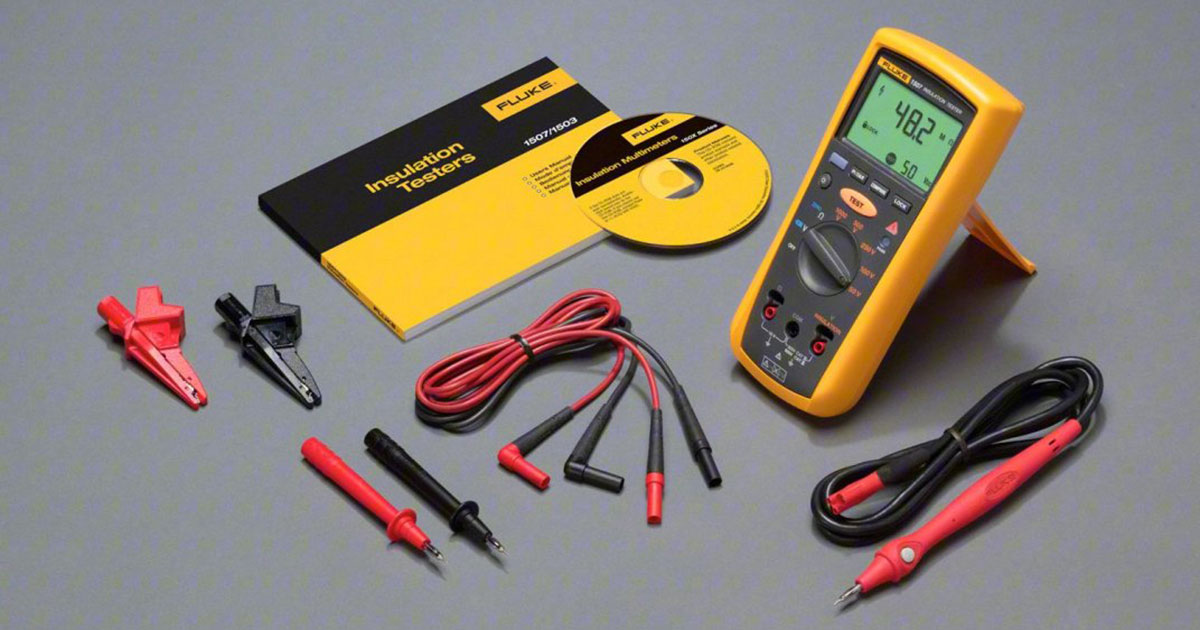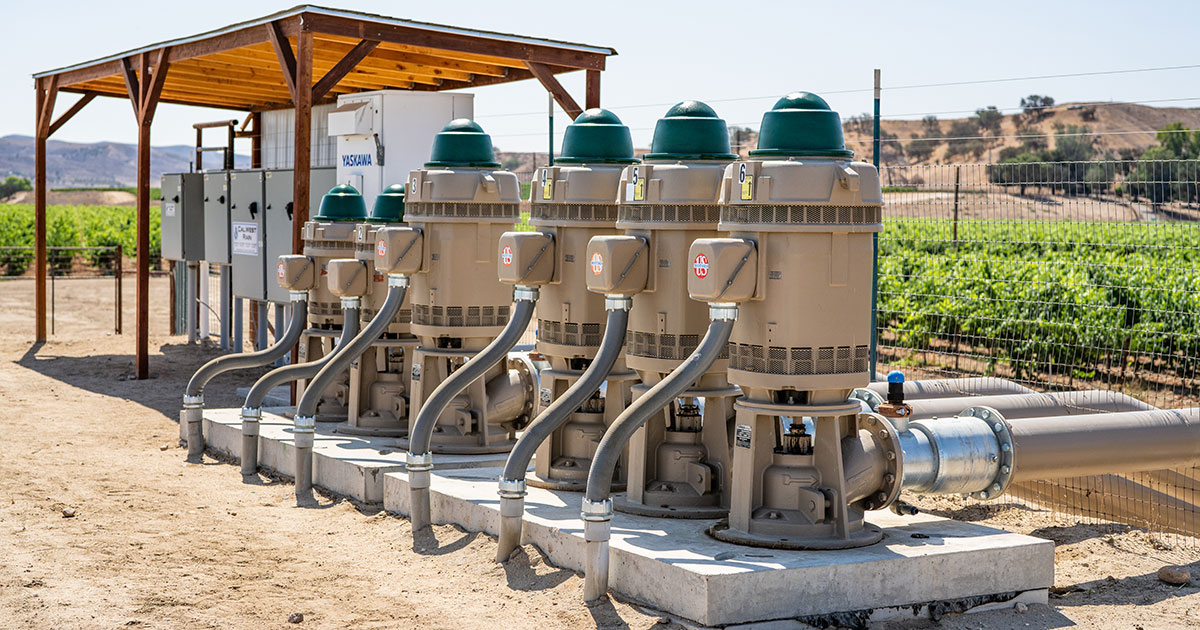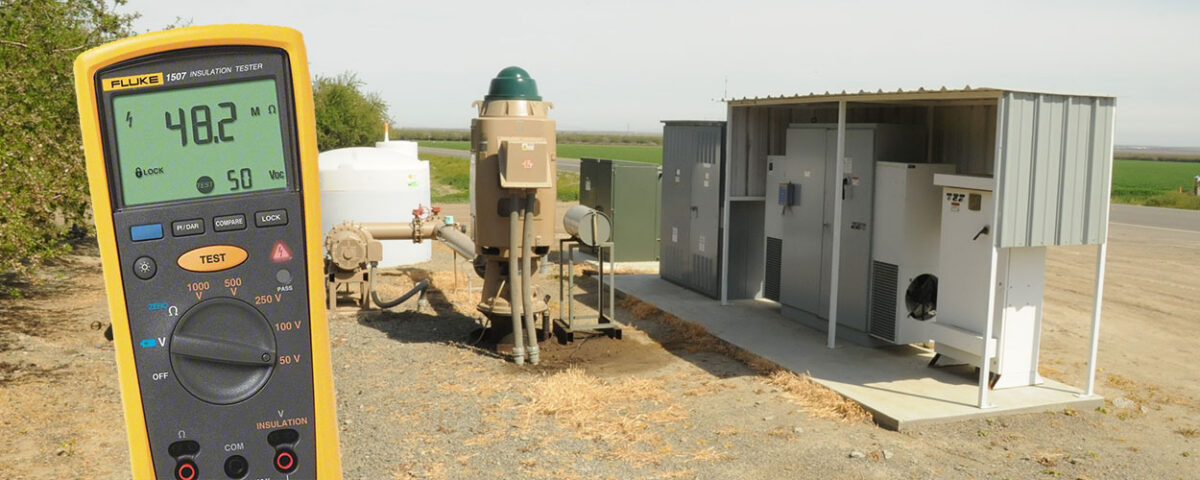Farms and ranches across California use a wide range of electric motors to operate pumps that move water from wells, canals, and reservoirs to irrigation systems, livestock, and other needs. As part of your season start-up or preventive maintenance, a megger test is recommended because it helps ensure motors are ready to run.
Operating motors that have been idle for several months and not periodically checked with a Megger can be risky in terms of unexpected downtime and costly repairs.
The article is intended to cover the “what” and “why” of megger testing, also known as “insulation testing.”
Key Takeaways:
- Megger tests are a very reliable tool for assessing the health of your motors to help avoid costly repairs and unexpected downtime.
- At a minimum, megger testing should be done as part of your seasonal startup or routine preventive maintenance.
- Over time, the insulation of all motors will degrade, and megger tests can be used to help identify needed motor repairs or rebuilds.
- Megger tests should be performed on motors that have not been operated for 90 days or longer.
- Megger tests should only be performed by a trained and experienced electrical technician.
What is Megger Testing?
Megger testing, also called insulation testing, tells you more about the condition of a motor’s electrical insulation. Over time, temperature shifts, moisture, dust, and contaminants can interfere with or degrade the motor’s electrical insulation.
What is the Tool Used to Perform a Megger Test?
The megohmmeter, or megger, is a device used to test electrical and insulation resistance. This is usually done by sending a high-voltage signal into the object being tested, typically a motor or wire. Using a megger is important for avoiding electric shock and equipment damage. Meggers have been used since the 1920s for testing various electrical devices which can measure greater than 1000 meg-ohms.

Fluke 1507 Insulation Tester (aka “Megger”)
Cal-West Rain technicians most often use the Fluke 1507 Insulation Tester. These tools can be purchased from local electrical supply houses like Graybar or online.
WARNING: Megger testing and related work should ONLY be performed by trained, qualified and experienced electrical technicians. This type of work includes a high risk of electrical hazards that may result in serious injury or death.
What Are the Benefits of Checking Motors with a Megger?
Although megger tests are not 100% perfect, they are proven diagnostic tools to help identify motors that are showing signs of degraded insulation which often indicate needed service or rebuild.
- Using a megger to determine if the motor’s insulation is adequate or intact helps avoid expensive failures and unexpected downtime.
- If the motor’s insulation is degraded, moisture is present, or the motor is going to ground, the megger test will help identify potential problems before the motor is operated and causes additional damage and downtime.
- Motors that fail megger tests should not be operated because the operation will likely damage it or cause the motor to burn.
- Motors that fail megger tests will typically require teardown and assessment by an experienced motor repair facility. Repairs and/or rebuilds can include a dip and rebake, a complete rewind, dip, and bake of the stator, and other repairs.
What Are the Risks of Not Performing Seasonal Megger Tests?
- Unexpected and costly downtime of irrigation/pumping equipment
- More extensive and costly damage to motors

Lift Pumps at a Central California Farm
What Are the Steps for Performing a Megger Test?
WARNING: Megger testing and related work should ONLY be performed by trained, qualified and experienced electrical technicians. This type of work includes a high risk of electrical hazards that may result in serious injury or death.
- Cut the power – Make sure you eliminate any voltage running through the wires you want to test.
- Isolate the motor – Disconnect the wires you want to test from both ends of the circuit and all feeding wires to motor. The motor must be isolated from any other electrical leads.
- Connect the ground lead – Connect one of the megger’s leads to a ground connection, such as the wire insulation, the electrical frame, or the ground.
- Testing each phase – Once you know you have a good ground, you start testing each phase of the motor to ground using the megger.
- Test results – Once you have the test results and you can make a determination.
- Making a determination – The determination is usually a black/white test, but sometimes there can be other issues not indicated by the megger test.
What Circumstances Warrant a Megger Test?
- Anytime a motor has not been operated in 90 days or longer.
- Quarterly tests are ideal (you can document and see motor deterioration and get ahead of a potentially expensive problem).
- Age, extreme temperatures, and animals (urine, feces, etc.) can break down a motor’s insulation.
What Happens When a Motor Fails the Megger Test?
- If a motor is going straight to ground, the motor usually gets pulled and taken to a local motor shop for evaluation. This includes tear down, cleaning, and inspection of the windings, insulation, bearings, and more to determine the recommended repairs.
- Once the teardown and inspection are completed, the motor repair shop provides an estimate for the recommended repairs and lead time to complete them.
- 90% of the time, motors are rebuilt, not replaced.
Who Provides Megger Testing and Seasonal Startups?
As a full-line irrigation and pump company, Cal-West Rain offers seasonal startup and megger testing services for customers across the San Joaquin Valley and on the Central Coast. This service typically includes the following and should be scheduled 30-60 days before the motor/pump is needed.
- Check and clean electrical panels
- Check and clean the motor (includes checking/changing oil and grease)
- Check the site for general operational readiness
- Perform the megger test, document results, and determine the next steps for each motor
- Documenting megohm numbers provides a historical record for each motor and can show insulation degradation over time
Getting Started with Megger Testing
Contact Cal-West Rain in Kerman, Paso Robles, Hanford or Bakersfield to discuss your operation and service needs. Our local sales/service representatives can prepare a quote for the required work and assist with scheduling. In some cases, a site visit may be required to assess the site/equipment to provide an accurate quotation.
Other Helpful Resources

